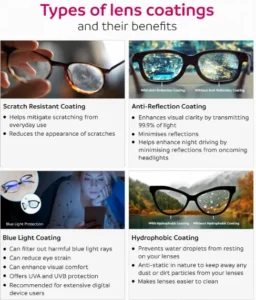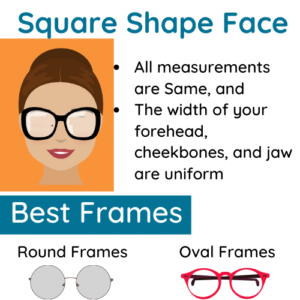Seven Types of Lens Coatings
Seven Types of Lens Coatings to Consider before Buying your next pair of prescription glasses

Author: Larry Zunde (Optometrist)
Date published: 24 June 2025
If you are about to purchase your next pair of prescription lenses, it pays to know that not all are created equal.
You see when it comes to choosing your next pair of glasses, there’s more to think about than just the frame. Lens coatings play a big role in how your glasses look, feel, and perform.
From reducing glare to protecting your eyes from UV damage, here are seven types of coatings worth knowing about along with some pros and cons of each.
1. Anti-Reflective (AR) Coating

Also known as anti-glare coating, AR is a must-have for anyone who spends time in front of screens or behind the wheel at night.
It helps eliminate harsh reflections from both the front and back of your lenses, making your vision clearer and your lenses almost invisible to others. This coating improves contrast and makes eye contact easier—great for both your function and fashion.
It’s especially beneficial for high-index, polycarbonate, or aspheric lenses, which naturally reflect more light. Whether you’re taking Zoom calls or night driving, this coating reduces halo effects and light flares for a much more comfortable experience.
Pro: Significantly reduces glare and reflections for clearer vision and better aesthetics.
Con: Can smudge easily and requires regular cleaning to stay clear.
2. Scratch-Resistant Coating

Scratches may not affect the structure of your lenses, but they can definitely interfere with how well you see—and they’re annoying. A scratch-resistant coating gives your lenses a tougher surface, helping to guard against everyday mishaps like dropping your glasses or cleaning them with the wrong cloth.
Most modern lenses, including high-index, polycarbonate, and Trivex, come with this coating built in. It’s especially important for kids’ eyewear, which often takes more of a beating.
While it won’t make lenses scratch-proof, it gives you a fighting chance against scuffs and scrapes.
Pro: Greatly improves lens durability and keeps vision clear for longer.
Con: Won’t prevent all scratches, especially deep ones caused by accidents.
3. UV Coating

You wouldn’t go out in the sun without sunscreen—so why expose your precious eyes to UV rays without some level of protection?
UV coating blocks 100% of harmful UVA and UVB rays that can contribute to long-term eye damage like cataracts and macular degeneration.
Thankfully, most high-index plastic lenses and many sunglasses come with UV protection built in.
However, standard plastic (CR-39) lenses usually need a special UV-blocking coating added, so it’s worth checking before you buy. This coating is invisible but powerful, giving your eyes the protection they deserve.
Pro: Shields your eyes from harmful sun exposure that can lead to serious eye conditions.
Con: Not always included in cheaper lenses—must request it if choosing CR-39 plastic.
4. Photochromic Treatment
Wish your glasses could adapt like sunglasses when you step outside? Photochromic lenses do exactly that. Also known by brand names like Transitions, these lenses darken in sunlight and lighten indoors, offering convenient protection from glare and UV rays without switching between two pairs of glasses.
They’re great for people with light sensitivity or those who want the flexibility of one pair of specs that does it all.
Available in most lens materials, photochromic lenses are practical and stylish—but keep in mind that they may not darken fully inside cars due to UV-blocking windshields.
Pro: Offers a convenient all-in-one solution that adapts to changing light.
Con: Doesn’t darken fully inside most cars due to limited UV exposure.
5. Anti-Fog Coating

We know that few things are more irritating than foggy lenses.
Whether it’s wintertime or you’re just stepping out of the gym, fogged-up glasses can be a real nuisance.
Anti-fog coatings help keep your vision clear by preventing moisture condensation on the lens surface.
This is especially useful for people who wear masks, work in humid environments, or play sports. While some anti-fog solutions come in the form of wipes or sprays, newer coatings are embedded into the lens, offering long-lasting fog resistance without extra maintenance.
Pro: Keeps your lenses clear in all types of weather or during workouts.
Con: Permanent anti-fog coatings may not be available with all lens types.
6. Tinted Lenses

Tinted lenses aren’t just a fashion statement—they can actually help your vision in specific situations. Yellow or amber tints may improve contrast in low-light or hazy conditions, while grey tints are ideal for outdoor use since they reduce brightness without distorting color.
Tints also come in a range of cosmetic colors to suit your personal style. More importantly, specially designed tints can reduce eye strain caused by long hours at the computer, helping with what’s known as Computer Vision Syndrome (CVS). Whether for sport, style, or screen time, there’s likely a tint that fits your needs.
Pro: Enhances contrast, reduces brightness, and adds personal flair.
Con: May not be ideal for all lighting conditions—some tints can distort colors.
7. Mirror Coating

Want to add a bold, reflective finish to your lenses? Mirror coatings not only look cool, but they also help reflect more light, making them popular for sunglasses, especially in bright outdoor settings like beaches or ski slopes.
These coatings come in fun metallic shades like silver, gold, and blue, and are usually applied over a tinted lens. Besides the aesthetic appeal, mirror coatings reduce glare and increase privacy by hiding your eyes.
Keep in mind, though, they scratch more easily than other coatings and may need extra care.
Pro: Looks stylish and helps reduce glare in very bright conditions.
Con: More prone to scratches and requires gentle handling.
If you’re unsure which lens coatings are right for you, your optometrist can help guide you based on your lifestyle and vision needs.
Remember—great lenses are more than just prescriptions; they’re about performance, protection, and personal comfort.
Also you have the option of combining any of the above for further eye comfort.
About the Author:
Larry Zunde is an optometrist with over 30 years experience at Larry Zunde Optometrists situated in Bedfordview.
His optometric training included an emphasis on eye exams, contact lenses fitting, ocular disease and low vision specialist. His optometric training also included working at St. Johns Eye Hospital, part of Baragwanath Academic Hospital, whilst doing his military service.





















